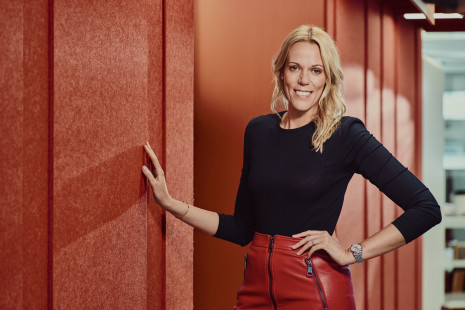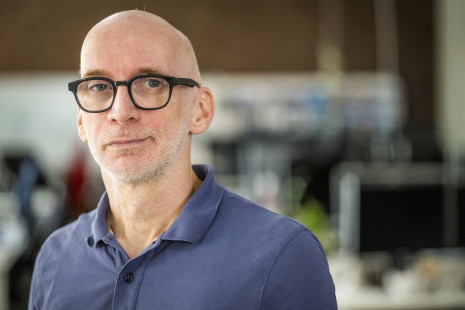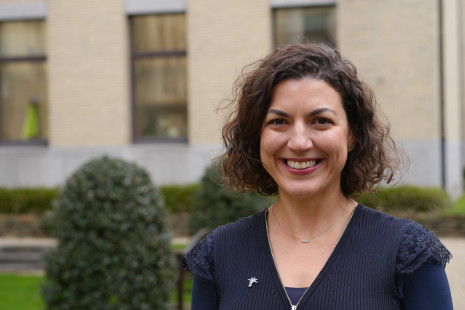Roeland Pelgrims
Co-founder and CEO Nobi
The question isn’t whether we adopt human-technology collaboration in health, but how quickly we can make it work.
© Roeland Pelgrims
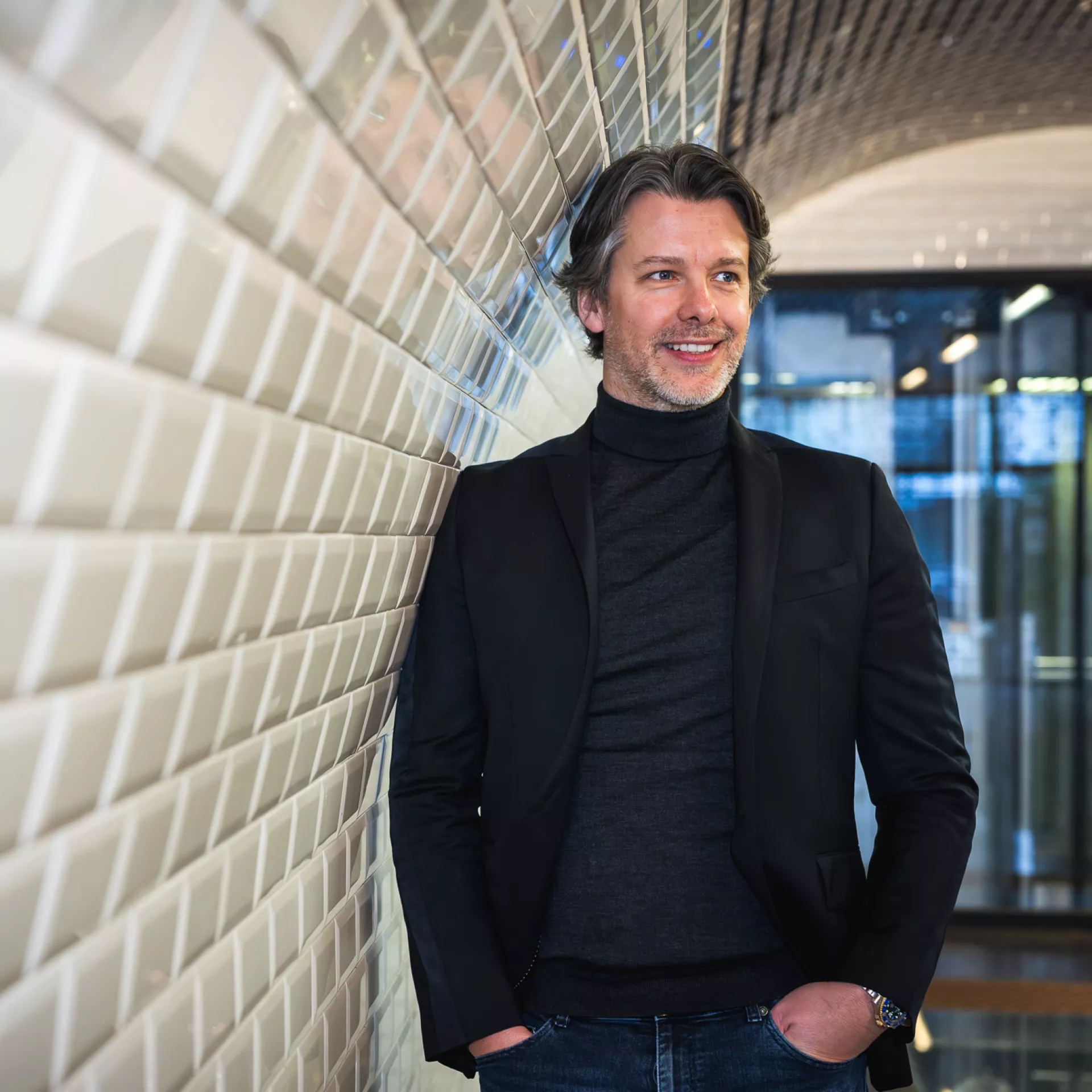
The future of healthcare: how Nobi lamps are changing lives
In a society where caregivers are under increasing pressure, the smart and beautiful Nobi-lamp uses AI technology to enhance the lives of older adults. As pioneers in age- tech, Nobi has raised 35 million to expand globally, beginning in the UK and the US, while keeping its headquarters in Antwerp. We sat down with CEO Roeland Pelgrims to discuss this exciting journey.
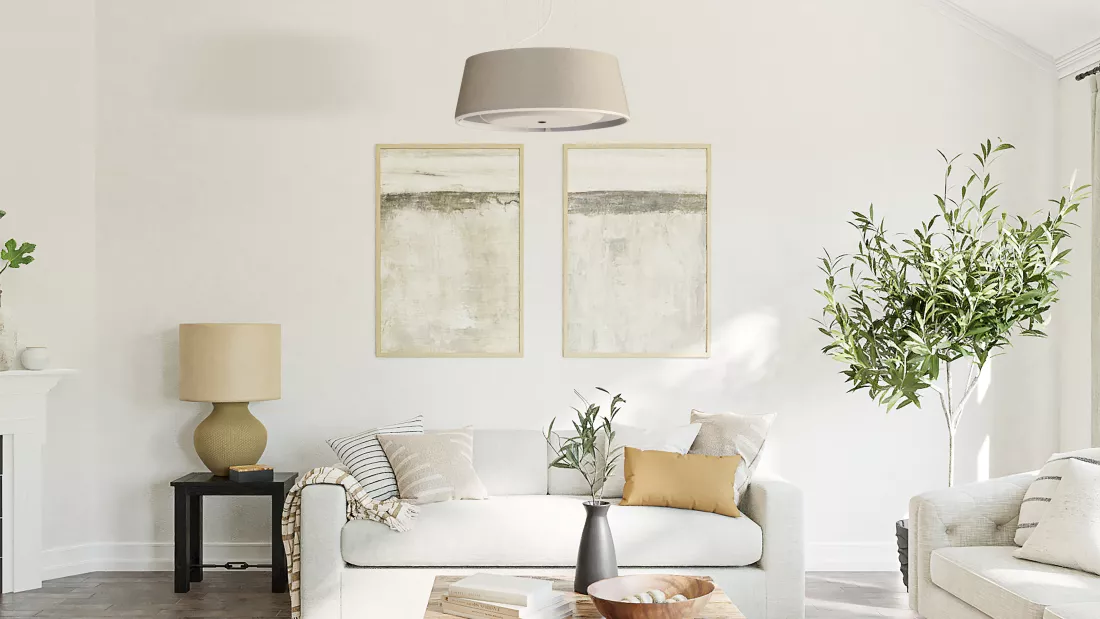
Hello Roeland, how does Nobi make a difference in healthcare?
“First, let me say that we are still pioneers in this market. Despite its potential, the adoption of high-tech solutions in elderly care remains very low. Nobi sets itself apart in three key ways. First, design—our lights are elegant and seamlessly fit into any home. Studies show that a well-designed environment enhances well-being. As I like to say, ‘Beauty is a moral duty.’ Second, performance—we have over 8,000 lamps installed and have never missed a fall. Reliability is crucial in this sector. Finally, our user-friendly platform offers more than just fall detection. We provide solutions for fall prevention, sleep monitoring, communication, and even reducing administrative work. Each fall we help prevent saves caregivers four to six hours of paperwork.”
How does it work?
“We use visual AI to detect when someone has fallen, so they don’t have to push an alarm button themselves. Everyone is talking about AI now, but we already started using it to interpret optical data back in 2018, giving us a seven-year head start. Nobi provides peace of mind: seniors feel safer knowing help is on the way, care staff don’t have to constantly check rooms, and families know their loved ones are in good hands. More importantly, Nobi doesn’t just detect falls—it helps prevent them, for example, by automatically turning on lights when someone gets out of bed at night and alerts staff when the risk of falling is high. This allows caregivers to proactively assist residents when they need to go to the bathroom at night.”
You're installing 3,700 Nobi lamps at Frontier Living in the US, one of the world’s largest care facilities. Why focus on the US and UK?
“These markets are more accessible than Europe, where healthcare regulations are fragmented and difficult to navigate. The US and UK have a more entrepreneurial mindset. When we tell them that we can reduce falls, ambulance rides, and hospitalizations, they say: ‘Prove it.’ And if we do, they move forward. In Belgium and Europe, the process is slower and less predictable—something investors and partners aren’t fond of.”
Yet Nobi remains headquartered in Antwerp, with production also based here. Why is that?
“On a personal level, I love Antwerp—it’s home. But from a business perspective, it also makes sense. The region is home to top universities that produce exceptional AI engineers, and unlike in many countries, talent here tends to stay loyal. Low labor mobility allows us to build a strong, long-term team, which is key in a deep-tech company like ours. Having both our production and development teams at the same site also ensures better quality, faster optimizations, and a more agile process. Additionally, we collaborate with a custom work company, that supports social employment.”
How do you deal with the changing global landscape?
“We stay flexible. If we need to shift production to the UK or the US, we will. To scale internationally, we’ll likely partner with third-party manufacturers. However, our Antwerp site will remain because the connection between development and manufacturing is too valuable.”
What would help Nobi grow even faster?
“We need a stronger health-tech ecosystem in this region. Creating an idea and a prototype is easy, but integrating new technology into existing healthcare systems is much more complex. Operational innovation is challenging. Adopting new solutions is costly and disruptive, which is why scale-ups need structural support to encourage fast decision-making, large-scale evaluations, and a more entrepreneurial approach.”
How do you see the future?
“It’s a tough question because uncertainty is everywhere nowadays. The only thing we know for sure is that the world is unpredictable. Our focus for 2025 is to become the market leader in the UK and US for senior living. However, because because both markets are fragile, we’re also exploring opportunities in Australia, New Zealand, South Korea, Japan, and parts of Europe.”
Will technology ever replace human caregivers?
“The question should be reframed: is talking to an AI robot better than talking to no one at all? Then, the answer is a firm yes. I believe AI will develop cognitive empathy within the next five years. Imagine an AI-powered companion for Alzheimer’s patients—one that listens, asks the right questions, and provides personalized, evidence-based interactions. Meanwhile, human caregivers can focus on what truly matters: personal attention and emotional connection. By 2030, there’s expected to be a global shortage of 4 million caregivers. The question is no longer whether we adopt human-technology collaboration, but how quickly we can make it work.”
Nobi in numbers
- 5.879 fall incidents detected in 2024
- 245 x 24-hour-periods lying on the floor-incidents prevented
- 53% reduction in falls where Nobi is active
Bio
Name: Roeland Pelgrims.
Job title: Co-founder and CEO, Nobi.
Age: 43.
Passionate about: Being passionate! Whether playing piano, kickboxing, jetskiing or working on our charity project in Africa, I love being fully immersed.
What drives me: Watching things grow, impacting people’s lives, and building meaningful and beautiful products.
Inspirational entrepreneurs: I’m fortunate to have Rudy Dekeyser, Philip Scheltens, and Patrick Gries as mentors on our board.
Recommended podcast: The Rest is Politics US, hosted by Anthony Scaramucci and Katty Kay.
